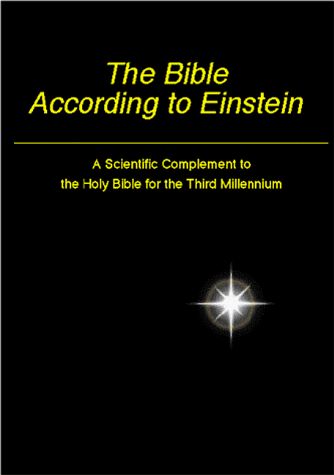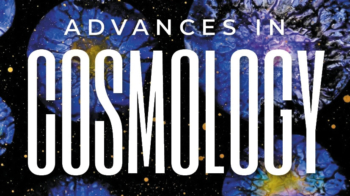Jupiter Scientific Publishing Co, New York, ISBN 0 9655176 9 1
Putting the word “God” in the title of a popular science book is a sure-fire way of boosting the sales figures. Now an anonymous group of authors has gone one better in producing The Bible According to Einstein. This is a curious book, from its sombre black cover, complete with Star of Bethlehem (or is that just a symbol of scientific enlightenment?) to its chapter-and-verse structure. In place of authors, the book has a spokesman, Stuart Samuel, a New York-based physicist. Why no authors? “The publisher decided not to list authors and contributors as a means of achieving two of the book’s goals: to mimic the Bible as much as possible in its style and structure while replacing religious issues with scientific ones and to create a feeling of awe.
There’s no doubt that the first goal has been achieved. “In the ‘beginning’, there was no beginning. Before the Planck time, there was no time and there was no space,” claims the opening line of Genesis I: The Planck Epoch. As for the second goal, I’m not so sure. It’s true that the book shares the Bible’s feeling of authority; this is no mere suggestion, this is the gospel truth. However, in that approach lies the book’s main shortcoming.
What attracted me to science was the realization that the universe is a mysterious place. There’s a great deal we don’t know about it and science is the great adventure of finding out. The book makes no attempt at analysis. It simply presents the whole canon of modern science as one fact after another, and that somehow takes away the excitement of finding out. So why did the anonymous authors choose the biblical style? Were they trying to provide a scientific alternative to the Christian Bible? According to Stuart Samuel, the book wasn’t written with scientific evangelism in mind. Rather it was designed to draw a distinction between the things that science is good at and the things that spirituality is good at. “When it comes to the universe that we observe with our senses, science is the best means of obtaining understanding,” said Samuel. “On the other hand, science cannot say anything about the purpose of life, about morality, nor about proper human conduct.” This point is driven home repeatedly throughout the book. The introduction notes that the moral code written down in the religious texts of all of the major religions hundreds of years ago is as valid today as it was then, while our scientific world view has changed beyond recognition.
Throughout history, storms of protest have greeted the gradual encroachment of science onto religion’s patch. This is no more than a misunderstanding, claims The Bible According to Einstein. “There is a line that exists between the domain of nature and the domain of God. People long ago drew the boundary by accident, not at the true line but in the land of science.” The obvious implication is that, once that misunderstanding is cleared up and the boundary finally fixed in its rightful place, science and religion will coexist in harmony.
The Bible According to Einstein is an extremely ambitious project. It contains an overview not only of every branch of science known to man, but also of the more traditional gospels. There are biographies of Moses, Christ, Muhammad and Gotama the Buddha. These are written in the same style as the rest of the book, as one fact after another. They tell the stories of some exceptional lives without developing the equally exceptional philosophies that those lives produced.
All that said, it is an enjoyable book to dip into, if only to see familiar ideas expressed in an unfamiliar way and Stuart Samuel does have a point the Biblical style does confer authority. It’s a quirky book, but there’s a lot of enjoyable reading in The Bible According to Einstein. Keep it next to your Bible, or whatever moral text you happen to subscribe to.






